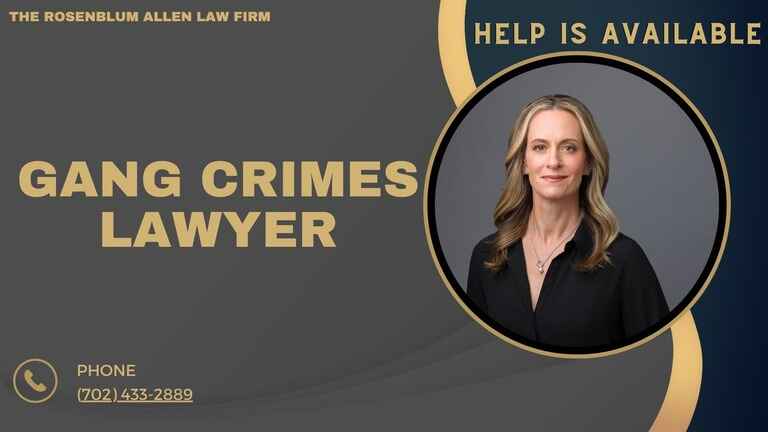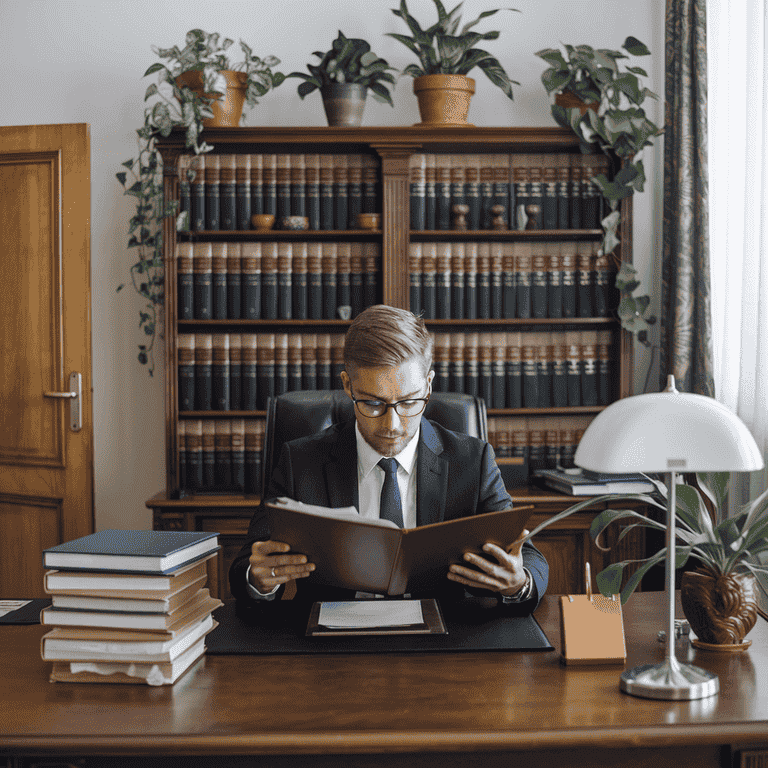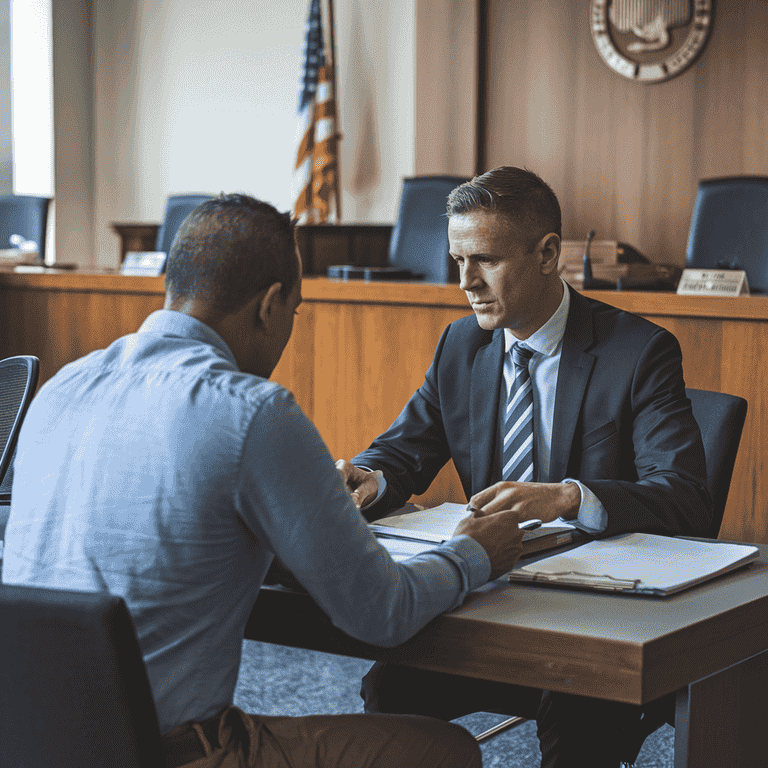Understanding Gang Crime Charges
What Are Gang Crimes?
Gang crimes involve illegal activities often associated with organized groups or gangs. Authorities may label a crime as gang-related if it appears motivated by gang activities or benefits a gang in some way.

Common Types of Gang-Related Activities
Gang crimes can include a wide range of activities. Some of the most common offenses tied to gang involvement include:
- Drug Trafficking: Distribution, possession, and sale of illegal drugs often fund gang operations.
- Violent Crimes: Assaults, robberies, and homicides are sometimes connected to gang conflicts or rivalries.
- Weapon Charges: Many gang-related cases involve illegal firearm possession or use.
- Theft and Vandalism: Crimes like auto theft or property vandalism may support gang activities.
- Human Trafficking and Exploitation: Some gangs are involved in more severe crimes, including exploitation and trafficking.
Each of these crimes carries serious penalties. When linked to gang activity, penalties can become even harsher.
Legal Implications and Severity of Gang Crimes
Gang crimes often come with “enhancements,” or additional charges that increase the potential punishment. These enhancements depend on factors such as:
- Gang Affiliation: Courts may impose stricter penalties if someone is proven to be affiliated with a gang.
- Type of Crime: Violent crimes and drug trafficking usually carry heavier sentences than vandalism or petty theft.
- Federal vs. State Charges: Some gang crimes are prosecuted at the federal level, especially if they involve organized crime across state lines or other major violations.
Understanding the serious nature of these allegations is crucial. Having a lawyer who specializes in these cases can help break down the charges and prepare a strong defense.
How Are Gang Crimes Prosecuted?
Gang crimes are prosecuted differently than other criminal cases. Prosecutors often use special laws to link defendants to gang activities, even if the connection may seem indirect.
Overview of Gang Enhancement Laws
Gang enhancement laws are intended to deter gang involvement. These laws can significantly increase sentences if the crime can be shown to benefit or involve a gang. For example:
| Crime | Without Gang Enhancement | With Gang Enhancement |
|---|---|---|
| Assault | Up to 4 years in prison | Up to 10 years or more |
| Drug Distribution | Up to 5 years | 10 years to life, depending on scope |
| Robbery | Up to 7 years | Up to 15 years or more |
These laws can also involve penalties like:
- Mandatory minimum sentences
- Additional fines and penalties
- Potential denial of parole or early release
Role of State vs. Federal Jurisdiction in Gang Crime Cases
Gang crime charges may be filed at the state or federal level, depending on the nature of the offense:
- State Jurisdiction: Most gang crimes are handled at the state level, especially if they occur within a single state or community.
- Federal Jurisdiction: Cases involving organized crime, drug trafficking across states, or violent acts on federal property are often prosecuted federally. Federal charges usually bring harsher penalties and are more challenging to fight.
Navigating state vs. federal charges requires a lawyer who understands the specifics of both systems. Each system has its own rules, procedures, and sentencing guidelines.
Types of Evidence Typically Used in Gang-Related Cases
Prosecutors gather evidence to establish both the crime and the gang affiliation. Typical evidence includes:
- Surveillance Footage: Video evidence of the alleged criminal act.
- Witness Statements: Testimonies from victims, law enforcement, or even rival gang members.
- Digital and Physical Evidence: Photos, videos, social media posts, or gang-related symbols found in the defendant’s possession.
- Gang Affiliation Evidence: Tattoos, clothing, social media posts, or communications with known gang members.
A lawyer who knows how to challenge this evidence can make a difference. Sometimes, evidence of gang affiliation is circumstantial and may not hold up under scrutiny.

Why You Need a Gang Crimes Lawyer
The Complexity of Gang Crime Cases
Gang crime cases are more complicated than many other criminal cases. Prosecutors may rely on association rather than concrete actions, claiming that the defendant’s alleged gang affiliation alone connects them to the crime.
Differences from Other Criminal Cases
Some unique factors that make gang-related charges different include:
- Enhanced Penalties: Gang enhancements can double or even triple standard sentences.
- Gang Affiliation: Even social or familial connections to gang members can complicate a case.
- Stigma and Prejudice: Jurors may carry biases against gang-affiliated defendants, making the trial process harder.
How Gang-Related Evidence Impacts Case Strategy
Because gang cases often hinge on affiliation evidence, building an effective defense requires strategic thinking:
- Disputing Gang Ties: Lawyers may work to establish that the defendant has no genuine connection to a gang.
- Refuting Gang Symbols or Language: Claims about gang signs, tattoos, or symbols may be contested to prevent assumptions of guilt.
- Highlighting Unreliable Evidence: Sometimes, gang affiliation claims rely on weak or circumstantial evidence that can be challenged.
Potential Penalties for Gang Crimes
The penalties for gang-related charges can vary widely, depending on the nature of the crime, any enhancements, and whether the case is state or federal.
Possible Sentences for Common Gang-Related Charges
Here’s a look at some common penalties:
| Charge | Typical Sentence (Without Gang Enhancement) | Enhanced Sentence (With Gang Enhancement) |
|---|---|---|
| Drug Trafficking | 5-10 years | 10 years to life |
| Assault | 1-4 years | Up to 10 years |
| Weapon Possession | Up to 3 years | Up to 7 years |
Impact of Gang Affiliation on Sentencing Enhancements
Gang affiliation can have a significant effect on sentencing. Enhancements can lead to:
- Longer Sentences: Gang affiliation often means added years to any baseline sentence.
- Higher Fines: Courts may impose substantial fines as part of the punishment.
- Mandatory Minimums and “Three Strikes” Laws: Gang crimes can activate “three strikes” sentencing, leading to life imprisonment if the defendant has prior convictions.
These penalties make a gang crimes lawyer essential. Without knowledgeable defense, a defendant may face sentences much harsher than standard criminal charges.
How a Gang Crimes Lawyer Can Help
Understanding Your Rights and Options
A gang crimes lawyer helps you understand your rights at every stage of the case. Facing charges can be overwhelming, and knowing what to expect can make it more manageable. Your lawyer can guide you through:
- Your Rights in Custody: Explaining what you should and shouldn’t say to police to avoid self-incrimination.
- Options for Plea Bargains: Discussing whether it’s in your best interest to take a plea or pursue other defense strategies.
- Defense Strategies: Outlining possible approaches to counter the prosecution’s arguments, such as challenging evidence or the gang affiliation itself.
Your lawyer will help you make informed decisions at each step.
Building a Strong Defense
Defending against gang crime charges often means addressing multiple aspects of the case. A gang crimes lawyer develops a personalized defense that fits the specifics of your situation. Common approaches include:
- Challenging Gang Affiliation Evidence: Proving a direct gang link can be difficult for prosecutors. Your lawyer can question the evidence and show that assumptions or stereotypes don’t apply in your case.
- Questioning Witness Credibility: In gang cases, witness testimonies might come from unreliable sources. A skilled lawyer knows how to expose inconsistencies or biases in witness statements.
- Suppressing Unlawfully Obtained Evidence: Any evidence gathered without proper procedure can be excluded from your case. A lawyer reviews how the evidence was gathered and fights to remove anything that violates your rights.
A strong defense often means examining each piece of evidence closely.
Navigating Court Proceedings
Court processes can be intimidating, especially in gang-related cases. A gang crimes lawyer ensures you understand each part of the process, from pre-trial hearings to possible trial procedures. Your lawyer will:
- File Motions: Requesting dismissals, evidence suppression, or other motions that can strengthen your position.
- Represent You in Court: Advocating on your behalf in front of judges and juries, aiming to present your side effectively.
- Handle Negotiations: If a plea is the best option, a skilled lawyer negotiates to get you the most favorable terms possible.
With an attorney’s guidance, you can approach each step with confidence.

Choosing the Right Gang Crimes Lawyer
Experience in Gang-Related Cases
Not all criminal lawyers have experience with gang crime cases. This area of law has unique challenges that require specific knowledge. When choosing a lawyer, look for someone who:
- Specializes in Gang Crimes: Lawyers with experience in gang crime cases understand the unique challenges, from gang enhancement laws to evidence tactics.
- Knows Local and Federal Laws: Gang crime cases often involve both state and federal laws. A well-versed lawyer knows how to handle cases under both systems.
- Understands the Community and Prosecutors: In gang cases, a lawyer familiar with local law enforcement and prosecutors can anticipate strategies and respond effectively.
Choosing an attorney with a strong background in gang crimes helps set you up for the best defense.
Questions to Ask a Potential Lawyer
Selecting the right lawyer for your gang crime case can make a huge difference. Here are some key questions to consider:
| Question | What to Listen For |
|---|---|
| What experience do you have in gang crime cases? | Look for a detailed explanation of similar cases handled. |
| How often do you work with clients facing gang enhancements? | Ensures the lawyer knows the specifics of gang-related sentencing. |
| What approach would you take for my case? | A lawyer should provide an initial outline of a strategy. |
| How do you handle communication? | Regular communication ensures you’re informed throughout. |
| What are the potential outcomes and risks? | The lawyer should give a realistic view of possible results. |
These questions help you understand the lawyer’s experience, approach, and communication style.
Red Flags to Watch Out For
Finding the right lawyer also means being aware of warning signs. Be cautious if you notice:
- Lack of Gang Crime Knowledge: If a lawyer avoids specifics or seems unfamiliar with gang-related cases, they may not be the right fit.
- Unrealistic Promises: No lawyer can guarantee an outcome. Be wary if someone promises you a dismissal or win without reviewing the case details.
- Poor Communication: If a lawyer is hard to reach or doesn’t explain things clearly, it can lead to confusion and frustration later on.
These signs may indicate the lawyer isn’t fully prepared to handle the unique nature of a gang crimes case.
What to Expect During a Gang Crimes Case
Initial Arrest and Booking
When you’re arrested on gang-related charges, the process begins with booking. During this phase:
- Identification is taken: Police will record your personal information, take fingerprints, and possibly a mugshot.
- Your charges are explained: You’ll be told the specific charges against you, which may include enhancements due to alleged gang involvement.
- Possibility of bail: Depending on the charges, you may be given a chance to post bail, though gang-related cases sometimes involve higher bail amounts or no bail option at all.
It’s vital not to make any statements to police at this time without a lawyer present. Anything you say could be used against you in court.
Initial Court Appearance and Bail Hearing
After booking, you’ll appear in court for an initial hearing. This is often when:
- Formal charges are read: The prosecutor officially lists the charges against you.
- A plea is entered: You’ll be asked to plead guilty, not guilty, or no contest. This is typically a procedural step, and your lawyer will guide you on the best plea to enter at this point.
- Bail is set or denied: The judge will decide if you’re eligible for bail and, if so, will set the amount.
In gang crime cases, prosecutors may argue against bail or request a high amount. A strong defense attorney can argue for bail, citing factors like your lack of prior offenses or strong community connections.
Pre-Trial Hearings and Motions
Before trial, several pre-trial hearings and motions take place to prepare the case. Your lawyer might file motions to:
- Suppress evidence: If any evidence was obtained improperly, it can be challenged, especially if your rights were violated during the arrest.
- Dismiss charges: If there isn’t enough evidence, your lawyer may ask to have the charges dropped.
- Limit gang-related details: If the gang connection isn’t relevant or could unfairly influence the jury, your lawyer may try to exclude this information from trial.
These hearings are crucial for clarifying what evidence can be used, strengthening your defense even before the trial starts.

Building a Defense for Trial
Defense Strategies in Gang Crimes Cases
Each gang crime case is unique, but common defense strategies include:
- Challenging the gang connection: Prosecutors often attempt to link a defendant to gang activities, even when the evidence is weak. Your lawyer can work to show that the connection is unclear or unfounded.
- Alibi and witness statements: If you weren’t at the scene or can provide witnesses who can confirm your whereabouts, this can be key in building your defense.
- Lack of specific intent: Many gang crime charges require proof that actions were meant to benefit the gang. If your lawyer can show that your actions weren’t gang-motivated, it weakens the case.
Building a strong defense means questioning every piece of evidence and presenting a clear, reasonable alternative story.
Role of Expert Witnesses
Expert witnesses can play an important role in gang crimes cases. These might include:
- Gang culture experts: They explain how gang affiliation is often misunderstood or overstated.
- Psychologists: In some cases, they testify on coercion or peer pressure, showing you acted under influence, not gang loyalty.
- Forensic experts: These specialists review physical evidence, like fingerprints or DNA, to challenge the prosecution’s findings.
Having the right experts can cast doubt on the prosecution’s case and present a more complete picture of the situation.
The Trial Process
In a trial, the prosecution presents its case, and your lawyer has the chance to:
- Cross-examine witnesses: This helps reveal any inconsistencies or biases in their statements.
- Present your defense: Your side will provide evidence, call witnesses, and explain your version of events.
- Make closing arguments: Both sides will summarize their case, trying to sway the jury’s decision.
A gang crimes trial can be tense, but an experienced attorney will know how to handle each piece of evidence and cross-examine witnesses to your advantage.
After the Trial: Sentencing and Appeals
Sentencing
If convicted, sentencing follows. In gang-related cases, sentences are often harsher, especially if a gang enhancement is added. During sentencing:
- The judge considers various factors: They’ll review your criminal history, the severity of the crime, and how it affected the community.
- Gang enhancements come into play: These can lead to longer prison terms or additional fines. Your lawyer will fight to minimize these if possible.
At this stage, a lawyer’s advocacy is key in seeking the lightest sentence based on your specific circumstances.
Options for Appeals
If convicted, you don’t necessarily have to accept the outcome. Appeals give you the chance to challenge parts of the trial. Common grounds for appeal in gang crime cases include:
- Errors in evidence admission: If evidence was allowed that shouldn’t have been, it can be a solid reason for an appeal.
- Jury bias or misconduct: An appeal could argue that jurors were influenced by bias or prejudices, leading to an unfair verdict.
- Ineffective legal representation: If your lawyer didn’t perform well, you may have grounds for a retrial.
While the appeals process can take time, it’s an important option for addressing mistakes or injustices in the trial.

Breaking It Down for You
Facing gang crime charges is a serious matter, but with the right legal representation, you can defend yourself against these accusations. Gang-related crimes often come with harsher penalties, so having an experienced gang crimes lawyer is essential. From the initial arrest to post-trial appeals, a lawyer will guide you through each step of the process, ensuring that your rights are protected and that you receive a fair trial.
Remember, every case is unique. A skilled lawyer will review all the facts, challenge any weak evidence, and work toward the best possible outcome for you. Whether you’re fighting for bail, challenging gang enhancements, or seeking a reduced sentence, having a solid defense strategy can make all the difference.
If you or someone you care about is facing gang crime charges, don’t wait. Reach out to an experienced gang crimes lawyer to start building your defense and fighting for your future.

Frequently Asked Questions
What defines a "gang crime" in Nevada?
A “gang crime” in Nevada refers to any offense committed in association with a criminal gang. This can include crimes like drug trafficking, assault, robbery, and homicide, among others. The key factor is that the crime was either committed for the benefit of the gang, or because of gang affiliation.
What are the potential consequences of gang crime charges?
Gang-related crimes typically come with severe penalties, especially when gang enhancements are added to the charges. Convictions may lead to longer sentences, larger fines, and a permanent criminal record. The severity depends on the nature of the crime, the involvement of the gang, and the defendant’s criminal history.
How does gang membership impact my case?
Gang membership can significantly affect the charges you face. Prosecutors often use gang affiliation to enhance penalties, arguing that the crime was committed for the benefit of the gang. This can lead to more severe consequences, even for crimes that might otherwise be less serious.
Can gang crime charges be dismissed?
While it is difficult to get gang-related charges completely dismissed, a skilled lawyer can sometimes argue that the prosecution lacks sufficient evidence to prove gang involvement. Depending on the situation, the charges may be reduced or negotiated in plea deals.
What is gang enhancement?
A gang enhancement is an additional penalty added to the sentence for certain crimes when the defendant is accused of committing the crime as part of a criminal gang. This can result in a much harsher sentence, sometimes doubling or tripling the penalties.
How do I know if I need a gang crimes lawyer?
If you are facing any charge that involves gang-related activity, it’s important to consult with a lawyer who specializes in gang crimes. Even if you’re not directly involved in a gang, if gang affiliation is mentioned in your case, a specialized lawyer can help mitigate the impact of gang allegations.
What if I am falsely accused of gang involvement?
False accusations of gang affiliation are not uncommon. If you are wrongfully linked to a gang, a skilled lawyer can help disprove these claims, challenge the evidence presented, and ensure your rights are protected. It’s important to act quickly and collect any evidence that can support your innocence.
How can a gang crimes lawyer help me with my case?
A gang crimes lawyer can help by analyzing the evidence, challenging the prosecution’s claims, negotiating plea deals, and defending your case in court. They will fight for a fair outcome, whether that means getting charges reduced, securing a favorable plea, or going to trial to fight the charges.
What if the evidence against me is strong?
Even if the evidence seems overwhelming, a gang crimes lawyer can still help. They can examine the evidence for any weaknesses, explore any possible defenses, and negotiate for reduced charges or a lesser sentence. Your lawyer’s job is to protect your rights and work toward the best possible outcome.
What happens if I am convicted of a gang crime?
If convicted of a gang-related crime, you may face a lengthy prison sentence, heavy fines, and other penalties such as probation. In some cases, a conviction can also lead to restrictions on employment and housing opportunities, making it critical to fight these charges as thoroughly as possible.

Additional Resources for You
Molly Rosenblum, Esq., our distinguished lead attorney, has meticulously developed an extensive suite of legal resources to provide crucial support and guidance for those facing criminal charges. Available on the Rosenblum Law website, these resources are designed to offer in-depth information and assistance across a wide range of criminal defense areas. Here’s a summary of the resources tailored to meet your needs in challenging times:
Criminal Defense Attorneys: Comprehensive support for individuals facing criminal charges, offering defense strategies and legal representation. Explore the resource.
Las Vegas DUI Lawyer: Specialized legal assistance for DUI charges in Las Vegas, providing crucial advice and representation to navigate the complexities of DUI law. Learn more.
Domestic Violence Lawyer Las Vegas: Expertise in handling domestic violence cases with sensitivity and the aim to achieve the best possible outcome for the client. Find support here.
Drug Possession Lawyer: Guidance and defense for those accused of drug possession, offering strategies to challenge the charges or minimize penalties. Start defending your case.
Sex Crimes Attorney: Specialized legal support for individuals accused of sex crimes, emphasizing defense strategies that protect the client’s rights and reputation. Seek expert advice.
CPS Defense Attorney: Dedicated assistance for cases involving child protective services, including child abuse and neglect allegations. Get help now.
Misdemeanor Lawyer: Legal representation for those facing misdemeanor charges, focusing on minimizing the impact and seeking favorable outcomes. Learn about your options.
Juvenile Defense Lawyers: Specialized defense services for minors facing criminal charges, aiming to protect their future and navigate the juvenile justice system. Protect your child’s future.
Las Vegas Warrant Defense Attorney: Assistance for individuals with outstanding warrants, aiming to resolve these issues with minimal legal repercussions. Address your warrant.
Las Vegas Probation Violation Attorney: Legal support for probation violation cases, focusing on defending against additional penalties and advocating for the client’s rights. Get legal support.
Theft Crime Defense Lawyer: Defense strategies for those accused of theft, aiming to challenge the evidence or negotiate reduced charges. Defend against theft charges.
Kidnapping Lawyers: Expert legal representation for kidnapping allegations, focusing on building a strong defense to contest the charges. Seek specialized representation.
Firearms Lawyer Las Vegas: Assistance for cases involving firearms charges, offering legal strategies tailored to Nevada’s gun laws. Understand your rights.
Through these resources, Molly Rosenblum, Esq., aims to empower you with the legal knowledge and support necessary to navigate the criminal justice system effectively. We encourage you to utilize these resources, ensuring you have access to the best possible defense in your time of need.

A Special Message from Our Lead Attorney

Molly Rosenblum
Thank you for taking the time to read through these resources. I understand that you may be going through a challenging time, and I want you to know you’re not alone. The legal system can be complex and intimidating, but you don’t have to navigate it alone.
My team and I at The Rosenblum Allen Law Firm are committed to providing the highest legal representation. We are here to answer your questions, guide you through the legal process, and advocate fiercely.
Please call us at 702-433-2889 to schedule a free consultation. During this call, we can discuss your case in detail, answer any questions you may have, and outline potential strategies for your defense.
Remember, every legal situation is unique, and the best way to understand your options is to speak with a professional. We are here to help, and we look forward to the opportunity to serve you.
Best Regards,
Molly Rosenblum, Esq.



